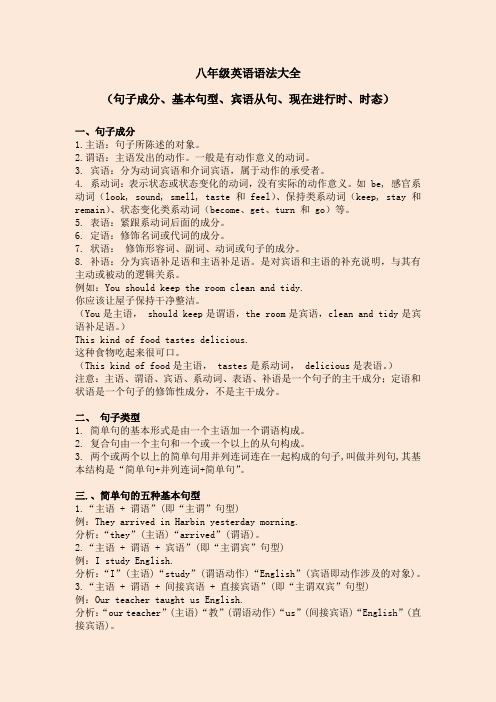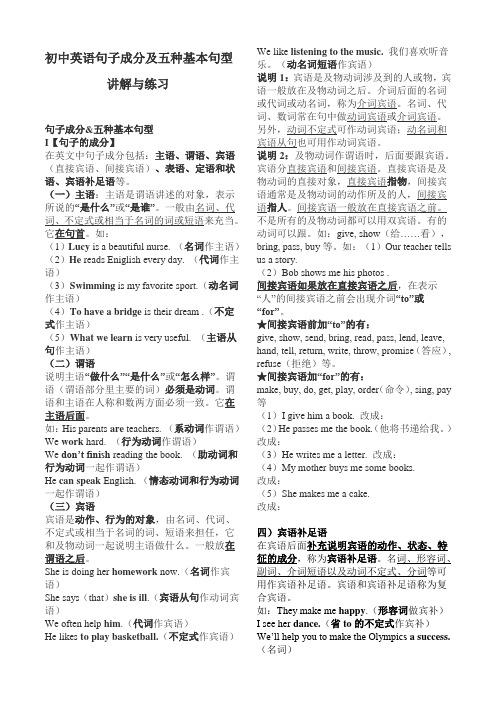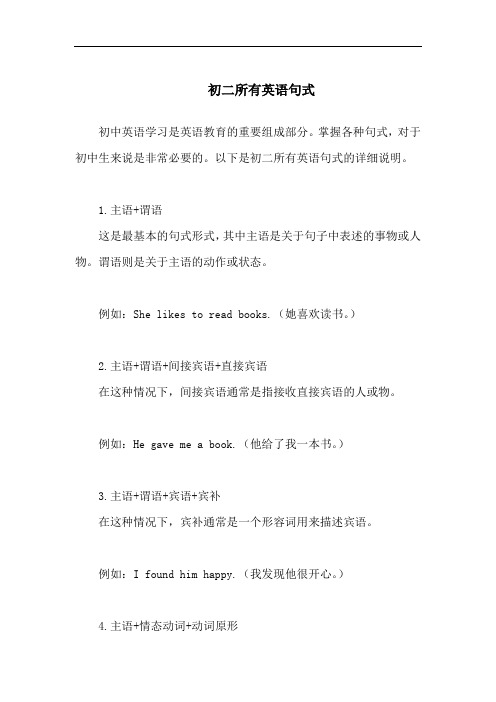初二英语--句子成分及基本句型讲解
人教英语八年级上册句子成分详解

Exercise practice
1.昨晚我写了一封信。
I wrote a letter last night. 2.这本书他读过多次了。
He has read this book many times. 3.他们成功地完成了计划。(carry out)
They have carried out the plan successfully. 4.你们必须在两周内看完这些书。(finish doing)
I don’t believe in(介) that man. He pointed out(副) the mistakes in my composition. On Christmas Day, we will call on(介)our foreign
teachers. You must hand in(副) your exercise-books after class. We cannot work out(副) the problem in five minutes.
有的含有介词 at, for, from, into, of, with, to 等 的动介词组是不可拆分的。如,look after( 照顾), look at(瞧), look for(寻找), belong to(属于), refer to(参考,提及), think of(考虑,评价), send for(派人去请 ), care for(喜欢),suffer from(受…之苦 ), deal with(对付,应付), object to(反对), pay for(付…的钱),等 。
动副词组都可以这样用,如,point out(指出), carry out(执行), put forward(提出), work out( 做出,算出), find out(找出), give up(放弃), give away(赠送,分发),pick up(拣起), put up( 挂上), 等。 总结:动+副构成的短语动词,宾语是名词可以置 中或置后,宾语是代词只能置中
初二英语句子结构

初二英语句子结构初二英语的句子结构复杂,同学们有做总结。
下面本人整理了初二英语句子结构,希望对你的学习有帮助!初中英语句子结构分析简单句的五个基本句型主语 + 不及物动词主语 + 及物动词 +宾语 She likes English.主语 + 系动词 +主语补语 She is happy.主语 + 双宾动词 +间接宾语 +直接宾语 She gave John a book. She bought a book for me.主语 + 宾补动词 + 宾语 + 宾语补语She makes her mother angry. The teacher asked me to read the passage.(There +be There lies a book on the desk. ) 初二英语句子1. 基本句型一:S +Vi (主+不及物动词)主语:可以作主语的成分有名词,主格代词,动词不定式,动名词等等。
主语一般在句首。
谓语:谓语由动词构成,是英语时态、语态变化的主角,一般在主语之后。
不及物动词(vi.)没有宾语,形成主谓结构,如:1. We │come.2. The sun│rose. 3 She came.4 My head aches.此句型的句子有一个共同特点:即句子的谓语动词都能表达完整的意思。
这类动词叫做不及物动词,后面可以跟副词、介词短语、状语从句等。
2. 基本句型二: S + V系 + P (主+系+表)此句型的句子有一个共同的特点:句子谓语动词都不能表达一个完整的意思,必须加上一个表明主语身份或状态的表语构成复合谓语,才能表达完整的意思。
这类动词叫做连系动词。
如:1. This │is │an English-Chinese dictionary.2. The dinner │smells │good.3. He │is growing │tall and strong. 系动词主要是起到连系主语和表语的作用。
句子结构专题初二英语句子成分及句子结构分析

句子结构专题初二英语句子成分及句子结构分析专题---句子成分句子的成分句子的类型五种基本句型A dog bites a man.A man bites a dog.分析句子:①英文有固定语序。
②词与词之间位置改变往往会使句子的意思也发生变化。
英文中最基本的语序是“主语+谓语动词+宾语”。
句子的成分认识一些基本概念主语:是句子要说明的人或物。
一般由名词、代词、不定式,动名词充当。
Telling a lie is wrong.Learning a foreign language takes a long time.谓语:说明主语的动作、状态、或特征,表示“干什么,是什么,怎么样?谓语和主语要在“人称”和“数”两方面必须保持一致。
He goes to work every day.They are swimming.We must work hard at English.宾语:表示行为动作的对象,是动作的承受者,一般由名词、代词、或动名词、不定式充当。
The child needs help.I hope to see you again.Tom likes swimming.宾语补足语:有些动词若只带一个宾语,句子意义还不是很完整,须另带一部分来说明宾语的情况或状态,这一部分就叫宾语补足语。
宾语和宾语补足语合称为复合宾语:We found the story quite interesting.We asked him to help us.状语:用来修饰动词、形容词或副词,也可以修饰整个句子。
通常由副词、介词短语、分词、不定式、从句来充当。
He was born in Shanghai in 1990.Suddenly it began to rain.定语:用来修饰名词或代词,通常由形容词、数词、不定式、分词、介词短语、从句来充当。
有前置定语和后置定语之分。
Our classroom is clean and bright.The man in a brown jacket is my father.简单句五种基本句型简单句的五种基本句型,关键在于谓语动词。
八年级英语语法大全(句子成分、基本句型、宾语从句、现在进行时、时态)

八年级英语语法大全(句子成分、基本句型、宾语从句、现在进行时、时态)一、句子成分1.主语:句子所陈述的对象。
2.谓语:主语发出的动作。
一般是有动作意义的动词。
3. 宾语:分为动词宾语和介词宾语,属于动作的承受者。
4. 系动词:表示状态或状态变化的动词,没有实际的动作意义。
如 be, 感官系动词(look, sound, smell, taste 和 feel)、保持类系动词(keep, stay 和remain)、状态变化类系动词(become、get、turn 和 go)等。
5. 表语:紧跟系动词后面的成分。
6. 定语:修饰名词或代词的成分。
7. 状语:修饰形容词、副词、动词或句子的成分。
8. 补语:分为宾语补足语和主语补足语。
是对宾语和主语的补充说明,与其有主动或被动的逻辑关系。
例如:You should keep the room clean and tidy.你应该让屋子保持干净整洁。
(You是主语, should keep是谓语,the room是宾语,clean and tidy是宾语补足语。
)This kind of food tastes delicious.这种食物吃起来很可口。
(This kind of food是主语, tastes是系动词, delicious是表语。
)注意:主语、谓语、宾语、系动词、表语、补语是一个句子的主干成分;定语和状语是一个句子的修饰性成分,不是主干成分。
二、句子类型1. 简单句的基本形式是由一个主语加一个谓语构成。
2. 复合句由一个主句和一个或一个以上的从句构成。
3. 两个或两个以上的简单句用并列连词连在一起构成的句子,叫做并列句,其基本结构是“简单句+并列连词+简单句”。
三.、简单句的五种基本句型1.“主语 + 谓语”(即“主谓”句型)例:They arrived in Harbin yesterday morning.分析:“they”(主语)“arrived”(谓语)。
初中英语句子成分+-五大基本句型(22张)可编辑全文

简单句的五种基本句型口诀:
英语句子万万千, 一种简单主谓型, 三种常见主系表, 五种主谓宾补型,
五种句型把线牵。 二种基本主谓宾, 四种主谓加双宾, 各种句型记心中。
Practice : work in groups
请判断下列句子的结构类型
• 1.He is running. • 2.The loud voice made him angry. • 3. Danny gave me an apple. • 4.She seemed angry. • 5.They laughed. • 6.I like English. • 7.My mother bought me a bike. • =My mother bought a bike for me. • 8.Jenny saw Danny buy many donuts. • 9.Jenny looks very happy. • 10.Ms.liu is kind.
7
6)表语:用来说明主语的性质 或状态。一般由名词或者形容词 担任。 如:This table is long. (这个桌子是长的。)
8
句子按照句子结构分类,可分为简单句、并列句 和复合句。句子的直接成分是主语和谓语。 简单句是只包含一个主语(或并列主语)和一个谓语 的句子,简单句分为五种基本句型。
英语基本句型
Miss Peng
1
英语句子成分分析
一个句子一般由两部分构成, 即主语部分和谓语部分, 这两部分也叫做句子的 主要成分。句子的次要成分 包括宾语,定语,状语,表语等。
2
1)主语:是一句话的主体,常用名词, 数词或代词担任,一般放于句首。如: Students study. (学生学习。) We are friends.(我们是朋友) 这两句话中单词students是个名词, we是代词,它们在句中做主语。
句子成分类型及五大基本句型

初中英语句子成分及五种基本句型讲解与练习句子成分&五种基本句型I【句子的成分】在英文中句子成分包括:主语、谓语、宾语(直接宾语、间接宾语)、表语、定语和状语、宾语补足语等。
(一)主语:主语是谓语讲述的对象,表示所说的“是什么”或“是谁”。
一般由名词、代词、不定式或相当于名词的词或短语来充当。
它在句首。
如:(1)Lucy is a beautiful nurse. (名词作主语)(2)He reads Eniglish every day. (代词作主语)(3)Swimming is my favorite sport.(动名词作主语)(4)To have a bridge is their dream .(不定式作主语)(5)What we learn is very useful. (主语从句作主语)(二)谓语说明主语“做什么”“是什么”或“怎么样”。
谓语(谓语部分里主要的词)必须是动词。
谓语和主语在人称和数两方面必须一致。
它在主语后面。
如:His parents are teachers. (系动词作谓语)We work hard. (行为动词作谓语)We don’t finish reading the book. (助动词和行为动词一起作谓语)He can speak English. (情态动词和行为动词一起作谓语)(三)宾语宾语是动作、行为的对象,由名词、代词、不定式或相当于名词的词、短语来担任,它和及物动词一起说明主语做什么。
一般放在谓语之后。
She is doing her homework now.(名词作宾语)She says(that)she is ill.(宾语从句作动词宾语)We often help him.(代词作宾语)He likes to play basketball.(不定式作宾语)We like listening to the music.我们喜欢听音乐。
初中英语句子结构和句型分析及细致讲解

初中英语句子结构和句型分析及细致讲解初中英语句子结构和句型是学习英语的基础。
下面我将为你详细讲解,并配以丰富的例句,帮助你更好地理解。
初中英语句子结构及句型详解一、句子成分英语句子主要由以下成分组成:•主语(Subject):句子所陈述的主体,通常是名词或代词。
例:I like apples.(我喜欢苹果。
)•谓语(Predicate):表示主语的动作或状态,通常是动词。
例:She is reading a book.(她正在看书。
)•宾语(Object):动作的承受者,通常是名词或代词。
例:He bought a car.(他买了一辆车。
)•定语(Adjective):修饰名词或代词,表示其性质或特征。
例:This is a beautiful flower.(这是一朵美丽的花。
)•状语(Adverb):修饰动词、形容词或副词,表示时间、地点、方式等。
例:He runs very fast.(他跑得很快。
)•补语(Complement):补充说明主语或宾语的状态或特征。
例:They made him happy.(他们使他高兴。
)二、句子种类根据句子结构和意义,英语句子可分为以下几类:•简单句(Simple Sentence):只有一个主谓结构的句子。
例:I like English.(我喜欢英语。
)•并列句(Compound Sentence):由两个或两个以上的简单句用并列连词(and, but, or等)连接而成。
例:I like apples, and she likes bananas.(我喜欢苹果,她喜欢香蕉。
)•复合句(Complex Sentence):由一个主句和一个或多个从句组成。
例:When I go home, I will do my homework.(当我回家时,我将做作业。
)三、句子类型•陈述句(Declarative Sentence):用来陈述事实或观点。
例:He is a student.(他是一个学生。
初二所有英语句式

初二所有英语句式初中英语学习是英语教育的重要组成部分。
掌握各种句式,对于初中生来说是非常必要的。
以下是初二所有英语句式的详细说明。
1.主语+谓语这是最基本的句式形式,其中主语是关于句子中表述的事物或人物。
谓语则是关于主语的动作或状态。
例如:She likes to read books.(她喜欢读书。
)2.主语+谓语+间接宾语+直接宾语在这种情况下,间接宾语通常是指接收直接宾语的人或物。
例如:He gave me a book.(他给了我一本书。
)3.主语+谓语+宾语+宾补在这种情况下,宾补通常是一个形容词用来描述宾语。
例如:I found him happy.(我发现他很开心。
)4.主语+情态动词+动词原形在这种情况下,情态动词用于表达可能性,需要,意愿,推测等情感。
例如:We can go now.(我们现在可以走了。
)5.主语+助动词+谓语动词的过去分词这种句式通常用于表达完成的动作。
例如:He has worked hard today.(他今天工作很努力。
)6.主语+谓语+直接引语这种句式通常用于引用别人的话。
例如:She said, “It’s a beautiful day outside.”(她说:“外面真漂亮。
”)7.主语+谓语+间接引语这种句式也用于引用别人的话,但是将它们转换为间接引语。
例如:He said that he would come tomorrow.(他说他明天会来。
)总之,以上七个句式是初中英语学习中最基本,最重要的句式。
掌握这些句式,可以提高初中生的英语水平,并为更高级别的英语学习打下坚实的基础。
- 1、下载文档前请自行甄别文档内容的完整性,平台不提供额外的编辑、内容补充、找答案等附加服务。
- 2、"仅部分预览"的文档,不可在线预览部分如存在完整性等问题,可反馈申请退款(可完整预览的文档不适用该条件!)。
- 3、如文档侵犯您的权益,请联系客服反馈,我们会尽快为您处理(人工客服工作时间:9:00-18:30)。
初二英语--句子成分及基本句型分析能力提升chance cover in pain in trouble medicalTony: Daming is training hard for the big match.Lingling: Yes, the team has a good (1) ________this year.Tony: Oh no, Daming’s (2)___________. He’s down!Lingling: It looks like he’s (3) __________Tony: Daming, what happened?Daming: It’s my leg.Lingling: (4) _________him with my coat.Tony: But don’t move him. Let’s wait for someone with (5) ____________training.Lingling: Ok.chance ,in trouble,in pain,Cover ,medicalclear inside power rock trouble warnInformation is coming in that there could be (1)__________because of heavy rain in the north. The government is (2)__________people about falling (3)_______. Some roads have a lot of rocks on them, but people are trying to (4) _______them quickly. In some places there is no(5)________.And people must stay (6)______to keep away from falling rocks。
Trouble,warning ,rocks ,clear, power ,inside从方框中选择适当的选项补全对话。
A.What can I do for you?B.I'm going to England for my holiday.C.You are welcome.D.With pleasure!E.What should I call people there?F.It's very kind of you.G.And you mustn't talk loudly in public places.A: Hi, Peter!Where are you going for your winter holiday?x k b 1 . c o mB: Hi, Bill!1.______ Can you tell me some rul es and customs in England?A: 2.______ First, you should drive on the left side of the road.B: OK!What's the next?A: 3.______B: I see.Is there anything else?A: It's not polite to ask personal questions, like “How old are you?” and “What's your salary (薪水) ?” B: 4.______A: You can call them Mr, Mrs, Ms or Miss before their family name.B: Great.Thanks very much.A: 5.______课外拓展Special buildings in JapanEarthquakes are very common in Japan. Many can cause a lot of damage. But now there are new ways of constructing buildings to make them safer and stronger during earthquakes. The Yokohama Landmark Tower is one of the tallest buildings in Japan. It is heavy and strong. It sits on rollers. This means the earth can rise and fall beneath the building without shaking it.反思总结课后作业American people have the habit of saying “Thank you” when something kind is done for them or something polite is said to them, no matter how easy the thing is. This habit is learned by people of many 1 countries.You should say “Thank you” when someone2you the salt on the table, when someone steps aside to let you 3in a corridor (走廊) , when someone 4ahead of you keeps the door open __5__ you, when someone says your work is well __6__ or you have bought a nice thing, or your city is very beautiful. “Thank you” is __7__ not only between strangers or new friends, but also between old friends, parents and children, brothers and sisters, husbands and wives. Parents often tell __8__ children that they should say “Thank you” in answering to a kind word or act when they are only four __9__ five years old. Perhaps that's __10__ almost everyone has got this habit.1.A. others B.another C.other D.else2.A. puts B.passes C.carries D.borrows3.A. pass B.jump C.sing D.dance4.A. jumps B.walks C.sits D.walking5.A. to B.with C.for D.on6.A. made B.done C.built D.doing7.A. tell B.said C.to say D.told8.A. his B.theirs C.their's D.their | 1 . c| O |m9.A. but B.and C.or D.so10 A. why B.because C.when D.reasonALadies firstIn America, just as in Europe, men usually open doors for women, and women always walk ahead of men into a room or a restaurant, unless the men have to be ahead of the ladies to choose the table, to open thedoor of a car or do some other things like the above. On the street, men almost always walk or cross the street on the closer side of the ladies to the traffic (交通).But if a man walks with two ladies, he should walk between them. Then if the host (主人) or hostess (女主人) or both of them come in a car to get their guest for dinner, the guest should sit at the front seat and leave the back seat though there are no people sitting on it. 1.In America, men usually ______.A.walk ahead of women B.eat in a restaurantC.walk behind women D.drive a car to work2.In the street, men ______.A.cross the street B.walk on the right side of the ladiesC.walk near the ladies D.walk on the closer side of the ladies to the traffic 3.If a man walks with two ladies, he should ______.A.walk between them B.run before themC.follow them D.go away4.If a man asks you to speak at a meeting, first you should say, “______”A.How are you? B.Is everyone here?[来源:学,科,网]C.Ladies an d gentlemen. D.How do you do?5.If Mrs Green invites you to her house in a car, you should ______.A.jump into the car B.sit at the front seatC.sit at the back seat D.drive the carBEnjoying Dinner with Friends in AmericaAmericans, like many people elsewhere in the world, like to invite friends to their hom es for an evening of food, drink and conversation. Formal dinners, in fine homes and hotels in the United States are much the same as formal dinners anywhere in the world. But as most people in the United States have no servants (佣人) , their dinner parties at home are mostly informal. Guests may sit down at a table, or, as many new small homes have no separate (单独的) dining room or very small dining space, guests can also serve themselves and eat in the living room, holding their plates on their knees.A more enjoyable form of entertainment is the picnic. Americans are great picnickers, and almost every family has a picnic basket. Summer invitations are often for a picnic at a park or in the open countryside. Unless hamburgers or hot dogs are cooked over a fire, picnic food is usually cold sandwiches, salads, potato chips, etc. Watermelon is a favourite dessert, followed very often by baseball for the young and active, and naps (打盹) for the weary (疲惫的;困乏的).6.What do most Americans like to do?A.To entertain friends at home with food and drink.B.To invite friends to some fine homes.C.To spend an evening with friends in the country.7.Why do most Americans prefer informal parties?A.Because they have no servants to help them.B.Because their houses are too small to hold formal dinner parties.C.Because it takes them too much time to prepare formal parties.8.Where do guests sit and eat at informal dinner?A.At a table in the dinning room.B.In the living room.C.Both A and B.9.According to the passage, what do people usually NOT have for a picnic?A.Cooked food. B.Hot food. C.Cold food.10.Why is the picnic said to be a more enjoyable form of entertainment?A.Because people can be closer to nature.B.Because a dessert is served.C.Because the whole family can have it together.C阅读短文,完成下列任务。
